Analyzing Health Outcomes and Social Factors in Joana's Case Study
VerifiedAdded on 2021/10/10
|7
|1695
|58
Case Study
AI Summary
This case study examines the health challenges faced by Joana, an Aboriginal and Torres Strait Islander woman, highlighting the impact of social determinants of health, cultural beliefs, and healthcare access. The analysis explores issues such as poverty, discrimination, and lack of access to services, which contribute to health disparities. The case study also discusses the role of cultural factors and beliefs in shaping Joana's decisions and experiences, including her perception of pregnancy and healthcare services. Furthermore, the study emphasizes the importance of understanding the historical context of colonization and its ongoing effects on Indigenous communities. The analysis underscores the significance of culturally sensitive healthcare, self-determination, and the need to address systemic racism to improve health outcomes for Aboriginal and Torres Strait Islander peoples. The case study concludes by emphasizing the role of education, cultural interaction, and the need for healthcare workers to adopt a supportive and non-discriminatory approach.
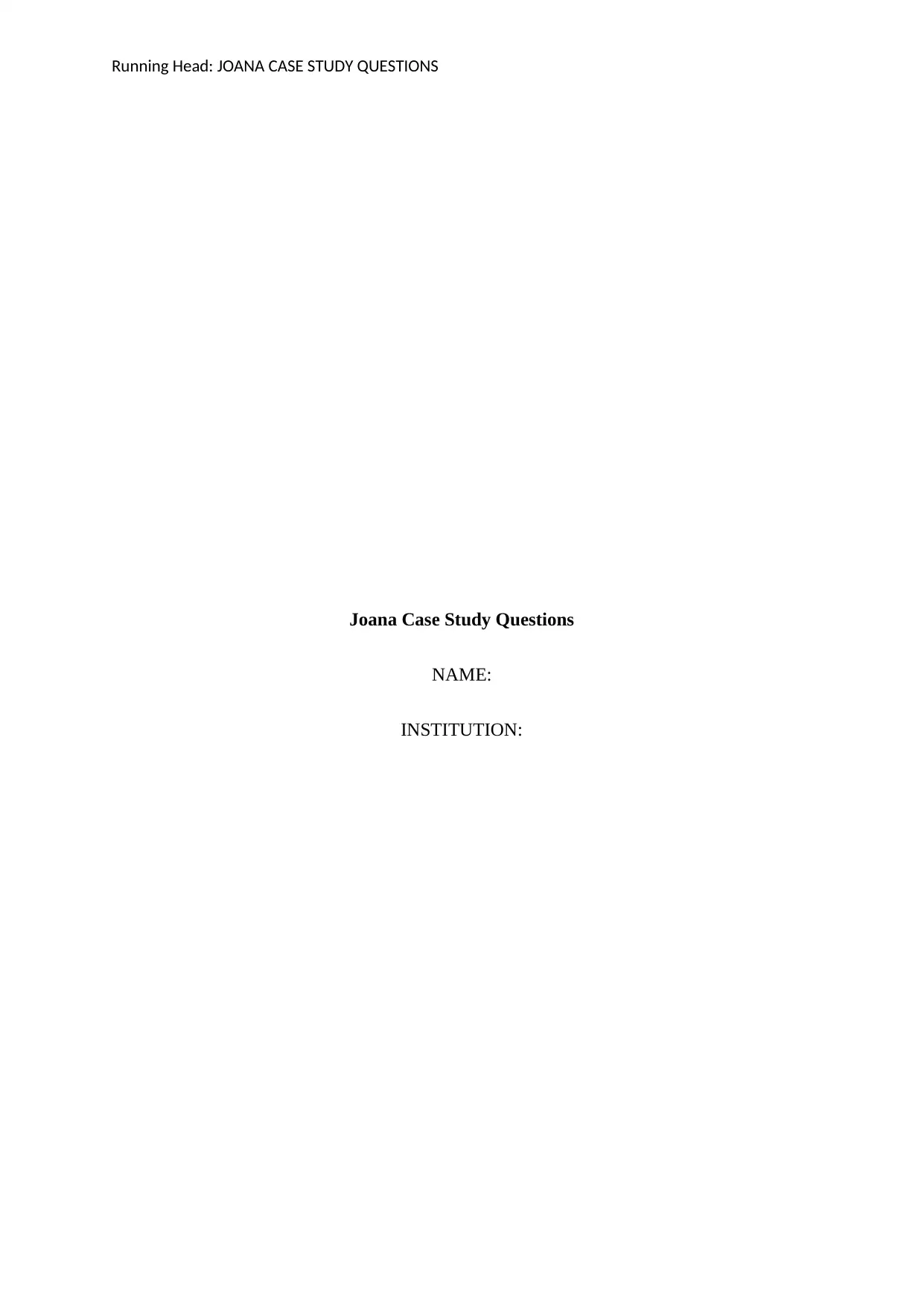
Running Head: JOANA CASE STUDY QUESTIONS
Joana Case Study Questions
NAME:
INSTITUTION:
Joana Case Study Questions
NAME:
INSTITUTION:
Paraphrase This Document
Need a fresh take? Get an instant paraphrase of this document with our AI Paraphraser
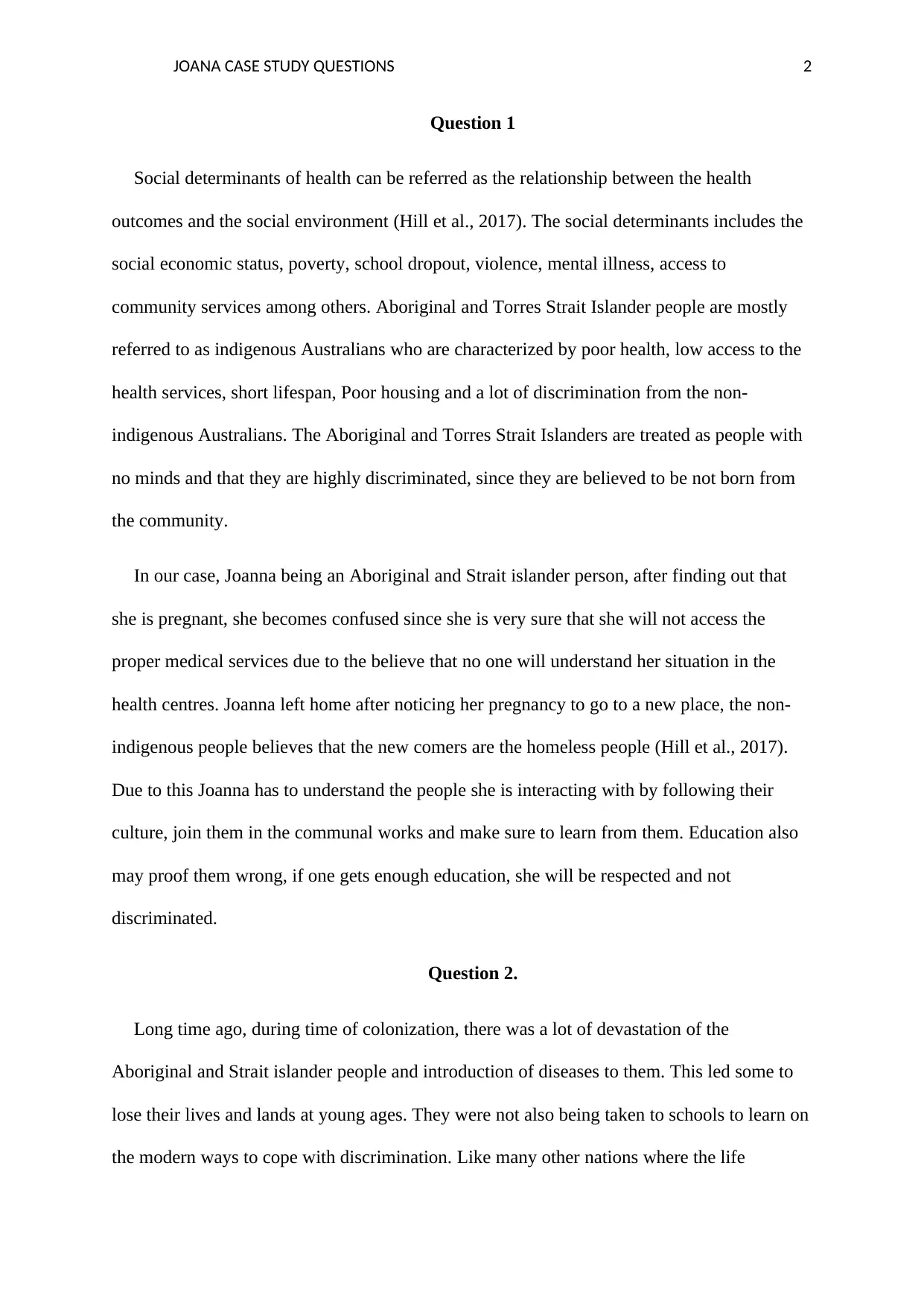
JOANA CASE STUDY QUESTIONS 2
Question 1
Social determinants of health can be referred as the relationship between the health
outcomes and the social environment (Hill et al., 2017). The social determinants includes the
social economic status, poverty, school dropout, violence, mental illness, access to
community services among others. Aboriginal and Torres Strait Islander people are mostly
referred to as indigenous Australians who are characterized by poor health, low access to the
health services, short lifespan, Poor housing and a lot of discrimination from the non-
indigenous Australians. The Aboriginal and Torres Strait Islanders are treated as people with
no minds and that they are highly discriminated, since they are believed to be not born from
the community.
In our case, Joanna being an Aboriginal and Strait islander person, after finding out that
she is pregnant, she becomes confused since she is very sure that she will not access the
proper medical services due to the believe that no one will understand her situation in the
health centres. Joanna left home after noticing her pregnancy to go to a new place, the non-
indigenous people believes that the new comers are the homeless people (Hill et al., 2017).
Due to this Joanna has to understand the people she is interacting with by following their
culture, join them in the communal works and make sure to learn from them. Education also
may proof them wrong, if one gets enough education, she will be respected and not
discriminated.
Question 2.
Long time ago, during time of colonization, there was a lot of devastation of the
Aboriginal and Strait islander people and introduction of diseases to them. This led some to
lose their lives and lands at young ages. They were not also being taken to schools to learn on
the modern ways to cope with discrimination. Like many other nations where the life
Question 1
Social determinants of health can be referred as the relationship between the health
outcomes and the social environment (Hill et al., 2017). The social determinants includes the
social economic status, poverty, school dropout, violence, mental illness, access to
community services among others. Aboriginal and Torres Strait Islander people are mostly
referred to as indigenous Australians who are characterized by poor health, low access to the
health services, short lifespan, Poor housing and a lot of discrimination from the non-
indigenous Australians. The Aboriginal and Torres Strait Islanders are treated as people with
no minds and that they are highly discriminated, since they are believed to be not born from
the community.
In our case, Joanna being an Aboriginal and Strait islander person, after finding out that
she is pregnant, she becomes confused since she is very sure that she will not access the
proper medical services due to the believe that no one will understand her situation in the
health centres. Joanna left home after noticing her pregnancy to go to a new place, the non-
indigenous people believes that the new comers are the homeless people (Hill et al., 2017).
Due to this Joanna has to understand the people she is interacting with by following their
culture, join them in the communal works and make sure to learn from them. Education also
may proof them wrong, if one gets enough education, she will be respected and not
discriminated.
Question 2.
Long time ago, during time of colonization, there was a lot of devastation of the
Aboriginal and Strait islander people and introduction of diseases to them. This led some to
lose their lives and lands at young ages. They were not also being taken to schools to learn on
the modern ways to cope with discrimination. Like many other nations where the life
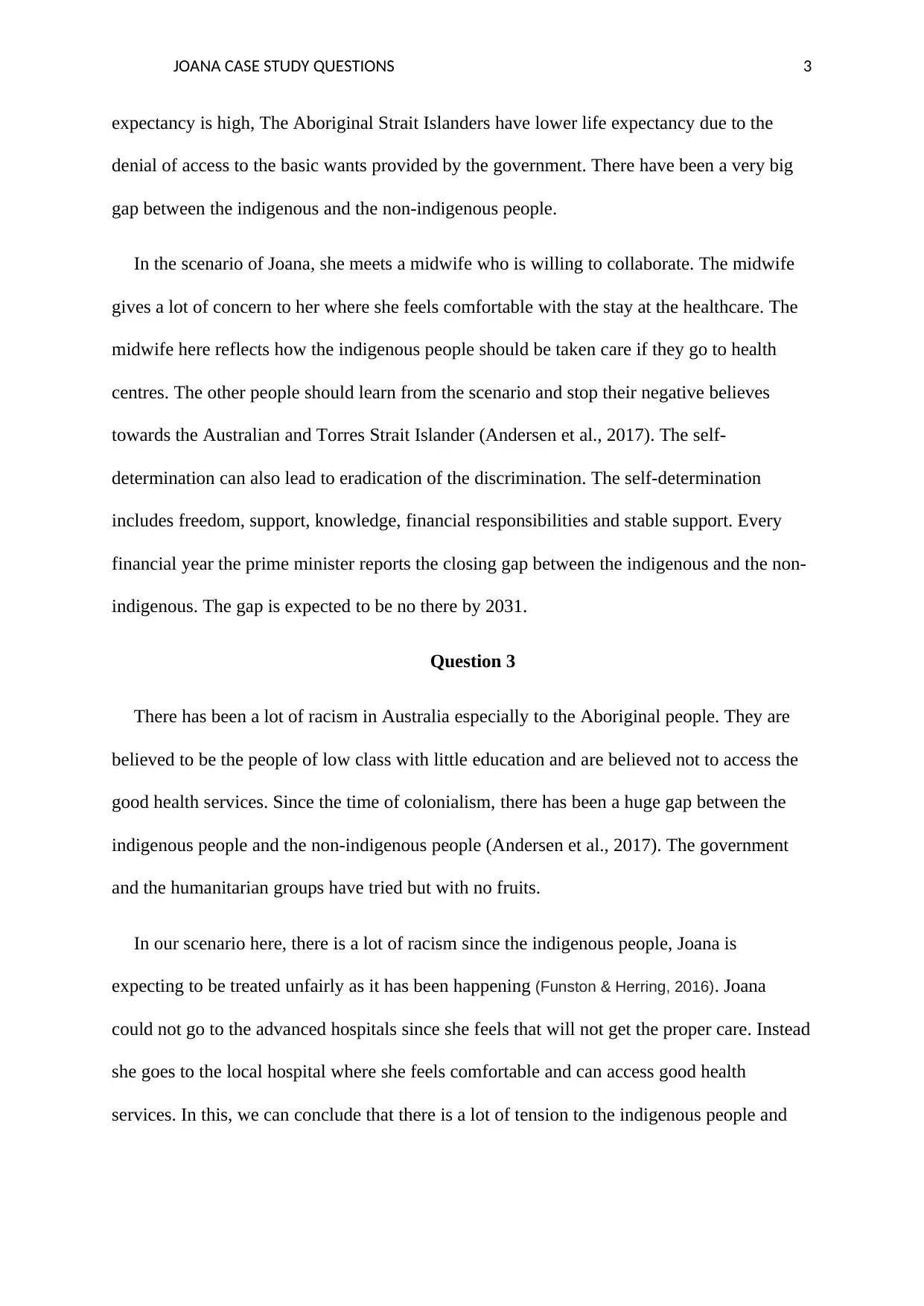
JOANA CASE STUDY QUESTIONS 3
expectancy is high, The Aboriginal Strait Islanders have lower life expectancy due to the
denial of access to the basic wants provided by the government. There have been a very big
gap between the indigenous and the non-indigenous people.
In the scenario of Joana, she meets a midwife who is willing to collaborate. The midwife
gives a lot of concern to her where she feels comfortable with the stay at the healthcare. The
midwife here reflects how the indigenous people should be taken care if they go to health
centres. The other people should learn from the scenario and stop their negative believes
towards the Australian and Torres Strait Islander (Andersen et al., 2017). The self-
determination can also lead to eradication of the discrimination. The self-determination
includes freedom, support, knowledge, financial responsibilities and stable support. Every
financial year the prime minister reports the closing gap between the indigenous and the non-
indigenous. The gap is expected to be no there by 2031.
Question 3
There has been a lot of racism in Australia especially to the Aboriginal people. They are
believed to be the people of low class with little education and are believed not to access the
good health services. Since the time of colonialism, there has been a huge gap between the
indigenous people and the non-indigenous people (Andersen et al., 2017). The government
and the humanitarian groups have tried but with no fruits.
In our scenario here, there is a lot of racism since the indigenous people, Joana is
expecting to be treated unfairly as it has been happening (Funston & Herring, 2016). Joana
could not go to the advanced hospitals since she feels that will not get the proper care. Instead
she goes to the local hospital where she feels comfortable and can access good health
services. In this, we can conclude that there is a lot of tension to the indigenous people and
expectancy is high, The Aboriginal Strait Islanders have lower life expectancy due to the
denial of access to the basic wants provided by the government. There have been a very big
gap between the indigenous and the non-indigenous people.
In the scenario of Joana, she meets a midwife who is willing to collaborate. The midwife
gives a lot of concern to her where she feels comfortable with the stay at the healthcare. The
midwife here reflects how the indigenous people should be taken care if they go to health
centres. The other people should learn from the scenario and stop their negative believes
towards the Australian and Torres Strait Islander (Andersen et al., 2017). The self-
determination can also lead to eradication of the discrimination. The self-determination
includes freedom, support, knowledge, financial responsibilities and stable support. Every
financial year the prime minister reports the closing gap between the indigenous and the non-
indigenous. The gap is expected to be no there by 2031.
Question 3
There has been a lot of racism in Australia especially to the Aboriginal people. They are
believed to be the people of low class with little education and are believed not to access the
good health services. Since the time of colonialism, there has been a huge gap between the
indigenous people and the non-indigenous people (Andersen et al., 2017). The government
and the humanitarian groups have tried but with no fruits.
In our scenario here, there is a lot of racism since the indigenous people, Joana is
expecting to be treated unfairly as it has been happening (Funston & Herring, 2016). Joana
could not go to the advanced hospitals since she feels that will not get the proper care. Instead
she goes to the local hospital where she feels comfortable and can access good health
services. In this, we can conclude that there is a lot of tension to the indigenous people and
⊘ This is a preview!⊘
Do you want full access?
Subscribe today to unlock all pages.

Trusted by 1+ million students worldwide
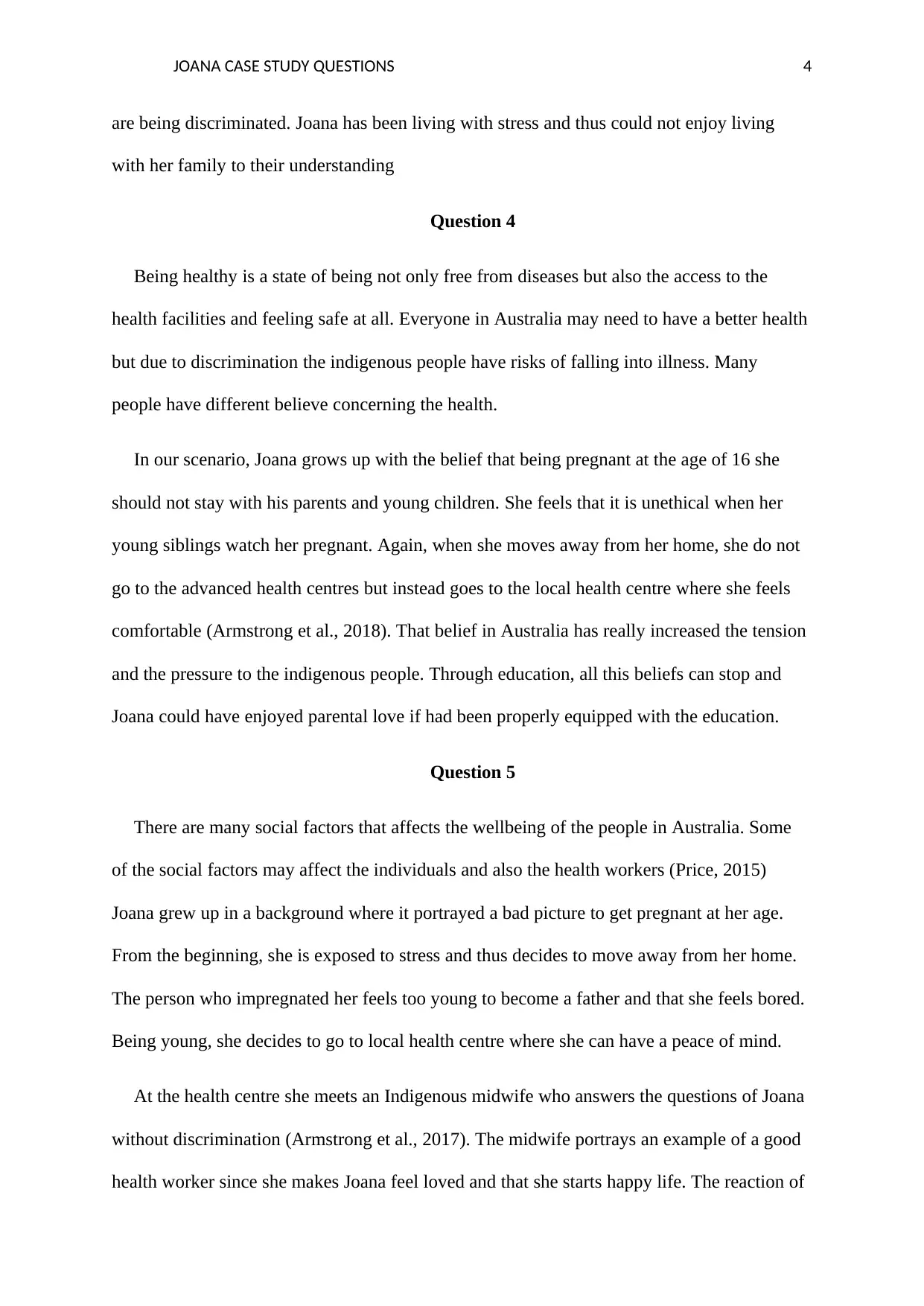
JOANA CASE STUDY QUESTIONS 4
are being discriminated. Joana has been living with stress and thus could not enjoy living
with her family to their understanding
Question 4
Being healthy is a state of being not only free from diseases but also the access to the
health facilities and feeling safe at all. Everyone in Australia may need to have a better health
but due to discrimination the indigenous people have risks of falling into illness. Many
people have different believe concerning the health.
In our scenario, Joana grows up with the belief that being pregnant at the age of 16 she
should not stay with his parents and young children. She feels that it is unethical when her
young siblings watch her pregnant. Again, when she moves away from her home, she do not
go to the advanced health centres but instead goes to the local health centre where she feels
comfortable (Armstrong et al., 2018). That belief in Australia has really increased the tension
and the pressure to the indigenous people. Through education, all this beliefs can stop and
Joana could have enjoyed parental love if had been properly equipped with the education.
Question 5
There are many social factors that affects the wellbeing of the people in Australia. Some
of the social factors may affect the individuals and also the health workers (Price, 2015)
Joana grew up in a background where it portrayed a bad picture to get pregnant at her age.
From the beginning, she is exposed to stress and thus decides to move away from her home.
The person who impregnated her feels too young to become a father and that she feels bored.
Being young, she decides to go to local health centre where she can have a peace of mind.
At the health centre she meets an Indigenous midwife who answers the questions of Joana
without discrimination (Armstrong et al., 2017). The midwife portrays an example of a good
health worker since she makes Joana feel loved and that she starts happy life. The reaction of
are being discriminated. Joana has been living with stress and thus could not enjoy living
with her family to their understanding
Question 4
Being healthy is a state of being not only free from diseases but also the access to the
health facilities and feeling safe at all. Everyone in Australia may need to have a better health
but due to discrimination the indigenous people have risks of falling into illness. Many
people have different believe concerning the health.
In our scenario, Joana grows up with the belief that being pregnant at the age of 16 she
should not stay with his parents and young children. She feels that it is unethical when her
young siblings watch her pregnant. Again, when she moves away from her home, she do not
go to the advanced health centres but instead goes to the local health centre where she feels
comfortable (Armstrong et al., 2018). That belief in Australia has really increased the tension
and the pressure to the indigenous people. Through education, all this beliefs can stop and
Joana could have enjoyed parental love if had been properly equipped with the education.
Question 5
There are many social factors that affects the wellbeing of the people in Australia. Some
of the social factors may affect the individuals and also the health workers (Price, 2015)
Joana grew up in a background where it portrayed a bad picture to get pregnant at her age.
From the beginning, she is exposed to stress and thus decides to move away from her home.
The person who impregnated her feels too young to become a father and that she feels bored.
Being young, she decides to go to local health centre where she can have a peace of mind.
At the health centre she meets an Indigenous midwife who answers the questions of Joana
without discrimination (Armstrong et al., 2017). The midwife portrays an example of a good
health worker since she makes Joana feel loved and that she starts happy life. The reaction of
Paraphrase This Document
Need a fresh take? Get an instant paraphrase of this document with our AI Paraphraser
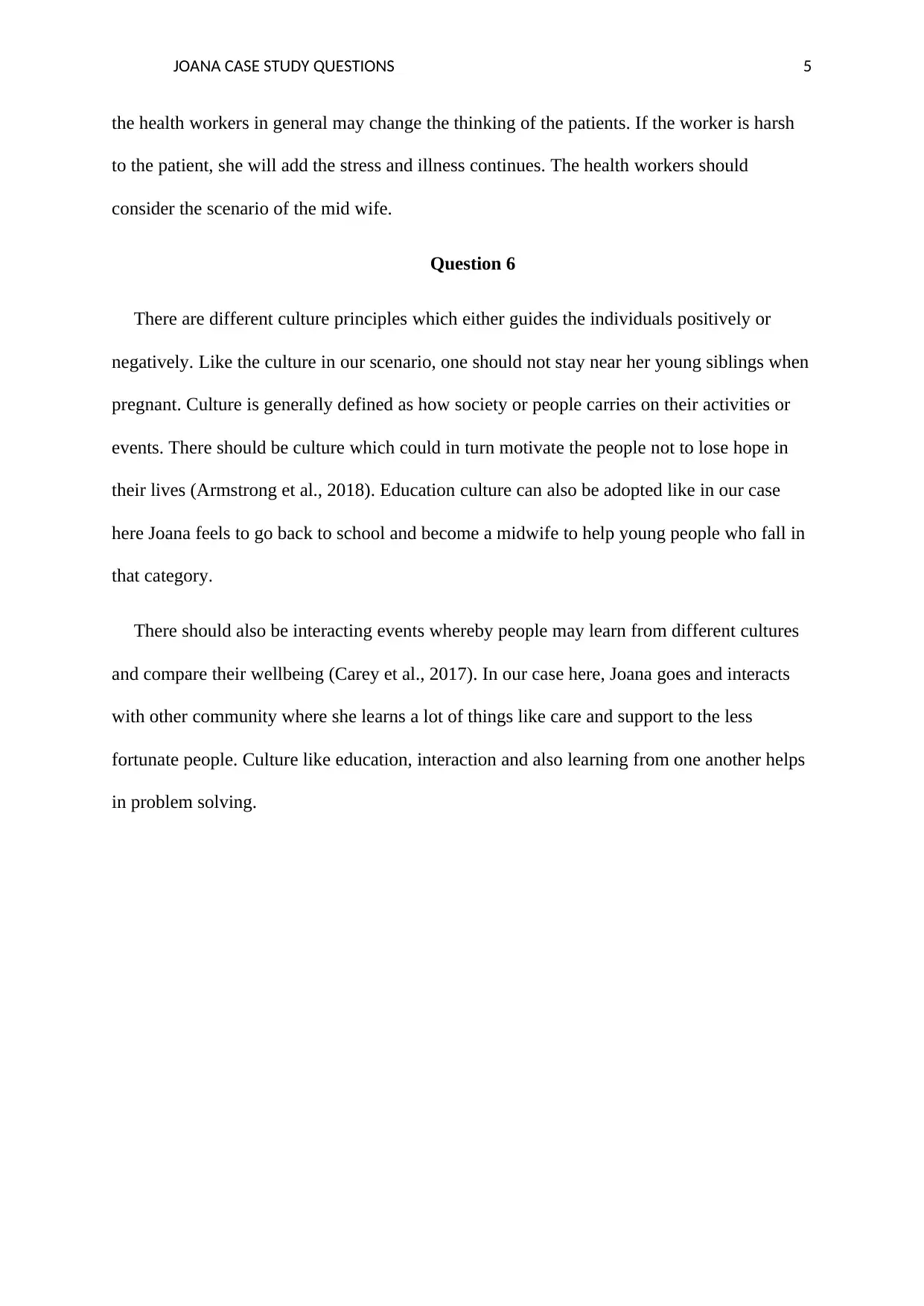
JOANA CASE STUDY QUESTIONS 5
the health workers in general may change the thinking of the patients. If the worker is harsh
to the patient, she will add the stress and illness continues. The health workers should
consider the scenario of the mid wife.
Question 6
There are different culture principles which either guides the individuals positively or
negatively. Like the culture in our scenario, one should not stay near her young siblings when
pregnant. Culture is generally defined as how society or people carries on their activities or
events. There should be culture which could in turn motivate the people not to lose hope in
their lives (Armstrong et al., 2018). Education culture can also be adopted like in our case
here Joana feels to go back to school and become a midwife to help young people who fall in
that category.
There should also be interacting events whereby people may learn from different cultures
and compare their wellbeing (Carey et al., 2017). In our case here, Joana goes and interacts
with other community where she learns a lot of things like care and support to the less
fortunate people. Culture like education, interaction and also learning from one another helps
in problem solving.
the health workers in general may change the thinking of the patients. If the worker is harsh
to the patient, she will add the stress and illness continues. The health workers should
consider the scenario of the mid wife.
Question 6
There are different culture principles which either guides the individuals positively or
negatively. Like the culture in our scenario, one should not stay near her young siblings when
pregnant. Culture is generally defined as how society or people carries on their activities or
events. There should be culture which could in turn motivate the people not to lose hope in
their lives (Armstrong et al., 2018). Education culture can also be adopted like in our case
here Joana feels to go back to school and become a midwife to help young people who fall in
that category.
There should also be interacting events whereby people may learn from different cultures
and compare their wellbeing (Carey et al., 2017). In our case here, Joana goes and interacts
with other community where she learns a lot of things like care and support to the less
fortunate people. Culture like education, interaction and also learning from one another helps
in problem solving.
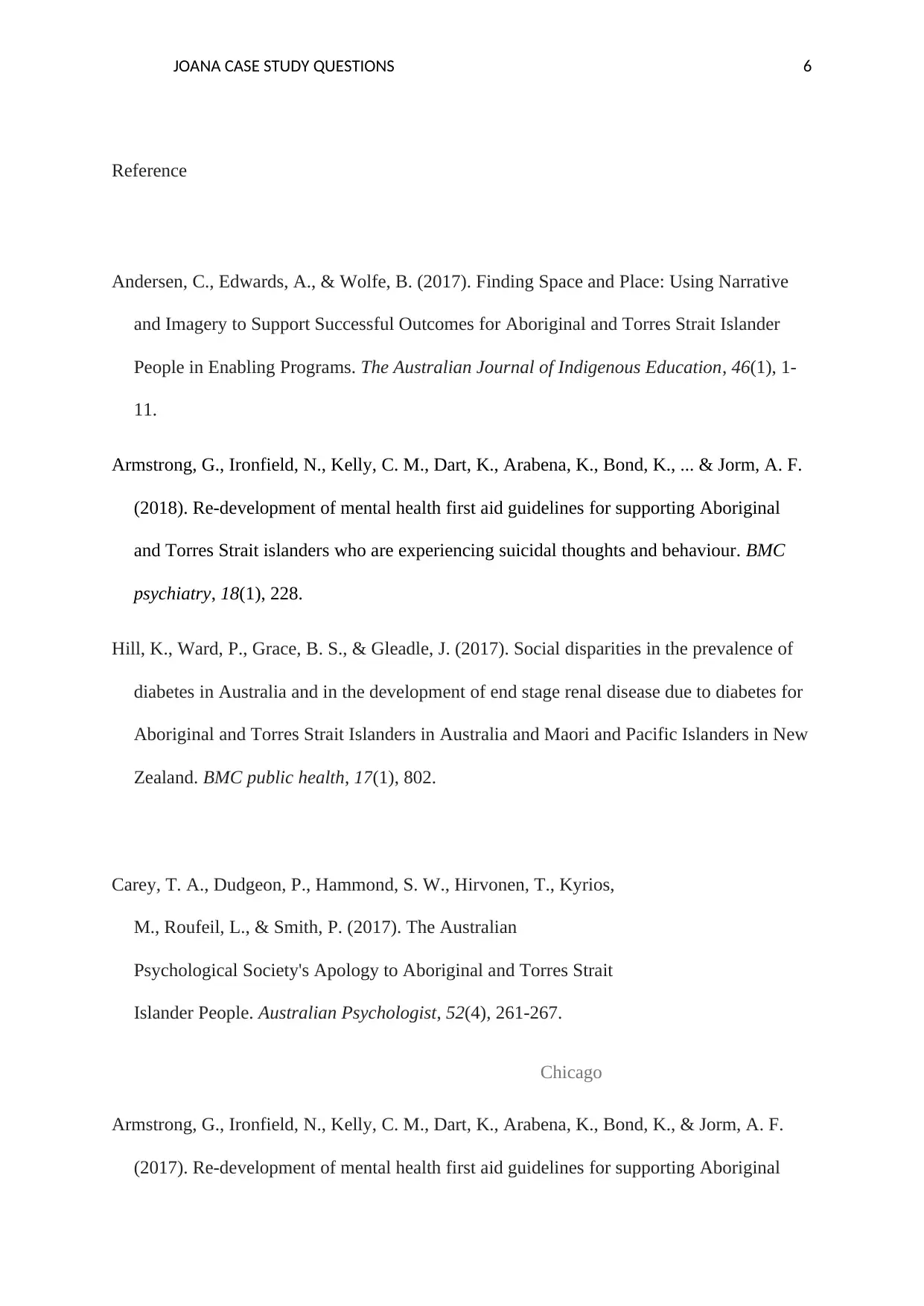
JOANA CASE STUDY QUESTIONS 6
Reference
Andersen, C., Edwards, A., & Wolfe, B. (2017). Finding Space and Place: Using Narrative
and Imagery to Support Successful Outcomes for Aboriginal and Torres Strait Islander
People in Enabling Programs. The Australian Journal of Indigenous Education, 46(1), 1-
11.
Armstrong, G., Ironfield, N., Kelly, C. M., Dart, K., Arabena, K., Bond, K., ... & Jorm, A. F.
(2018). Re-development of mental health first aid guidelines for supporting Aboriginal
and Torres Strait islanders who are experiencing suicidal thoughts and behaviour. BMC
psychiatry, 18(1), 228.
Hill, K., Ward, P., Grace, B. S., & Gleadle, J. (2017). Social disparities in the prevalence of
diabetes in Australia and in the development of end stage renal disease due to diabetes for
Aboriginal and Torres Strait Islanders in Australia and Maori and Pacific Islanders in New
Zealand. BMC public health, 17(1), 802.
Carey, T. A., Dudgeon, P., Hammond, S. W., Hirvonen, T., Kyrios,
M., Roufeil, L., & Smith, P. (2017). The Australian
Psychological Society's Apology to Aboriginal and Torres Strait
Islander People. Australian Psychologist, 52(4), 261-267.
Chicago
Armstrong, G., Ironfield, N., Kelly, C. M., Dart, K., Arabena, K., Bond, K., & Jorm, A. F.
(2017). Re-development of mental health first aid guidelines for supporting Aboriginal
Reference
Andersen, C., Edwards, A., & Wolfe, B. (2017). Finding Space and Place: Using Narrative
and Imagery to Support Successful Outcomes for Aboriginal and Torres Strait Islander
People in Enabling Programs. The Australian Journal of Indigenous Education, 46(1), 1-
11.
Armstrong, G., Ironfield, N., Kelly, C. M., Dart, K., Arabena, K., Bond, K., ... & Jorm, A. F.
(2018). Re-development of mental health first aid guidelines for supporting Aboriginal
and Torres Strait islanders who are experiencing suicidal thoughts and behaviour. BMC
psychiatry, 18(1), 228.
Hill, K., Ward, P., Grace, B. S., & Gleadle, J. (2017). Social disparities in the prevalence of
diabetes in Australia and in the development of end stage renal disease due to diabetes for
Aboriginal and Torres Strait Islanders in Australia and Maori and Pacific Islanders in New
Zealand. BMC public health, 17(1), 802.
Carey, T. A., Dudgeon, P., Hammond, S. W., Hirvonen, T., Kyrios,
M., Roufeil, L., & Smith, P. (2017). The Australian
Psychological Society's Apology to Aboriginal and Torres Strait
Islander People. Australian Psychologist, 52(4), 261-267.
Chicago
Armstrong, G., Ironfield, N., Kelly, C. M., Dart, K., Arabena, K., Bond, K., & Jorm, A. F.
(2017). Re-development of mental health first aid guidelines for supporting Aboriginal
⊘ This is a preview!⊘
Do you want full access?
Subscribe today to unlock all pages.

Trusted by 1+ million students worldwide
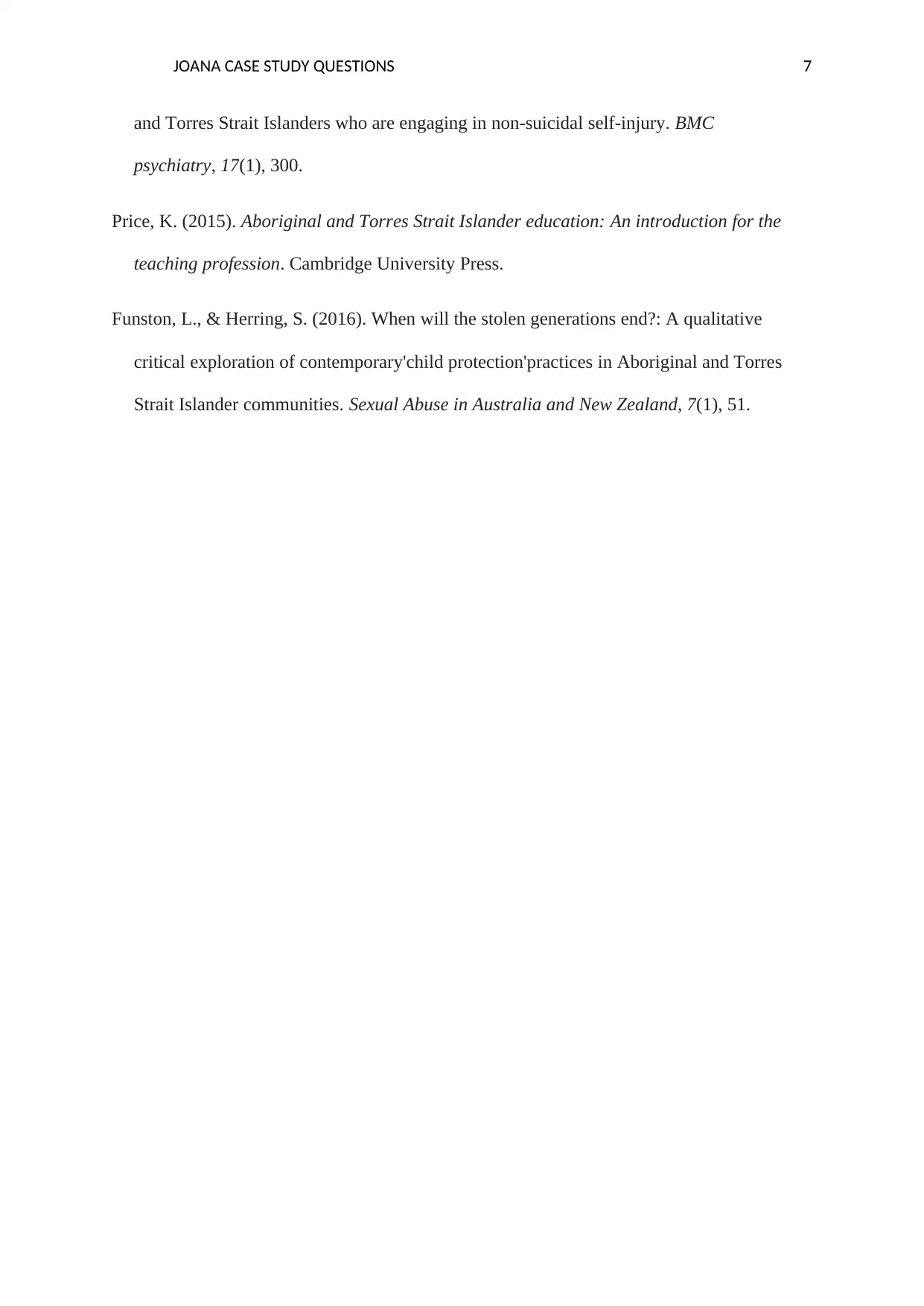
JOANA CASE STUDY QUESTIONS 7
and Torres Strait Islanders who are engaging in non-suicidal self-injury. BMC
psychiatry, 17(1), 300.
Price, K. (2015). Aboriginal and Torres Strait Islander education: An introduction for the
teaching profession. Cambridge University Press.
Funston, L., & Herring, S. (2016). When will the stolen generations end?: A qualitative
critical exploration of contemporary'child protection'practices in Aboriginal and Torres
Strait Islander communities. Sexual Abuse in Australia and New Zealand, 7(1), 51.
and Torres Strait Islanders who are engaging in non-suicidal self-injury. BMC
psychiatry, 17(1), 300.
Price, K. (2015). Aboriginal and Torres Strait Islander education: An introduction for the
teaching profession. Cambridge University Press.
Funston, L., & Herring, S. (2016). When will the stolen generations end?: A qualitative
critical exploration of contemporary'child protection'practices in Aboriginal and Torres
Strait Islander communities. Sexual Abuse in Australia and New Zealand, 7(1), 51.
1 out of 7
Related Documents
Your All-in-One AI-Powered Toolkit for Academic Success.
+13062052269
info@desklib.com
Available 24*7 on WhatsApp / Email
![[object Object]](/_next/static/media/star-bottom.7253800d.svg)
Unlock your academic potential
Copyright © 2020–2026 A2Z Services. All Rights Reserved. Developed and managed by ZUCOL.





